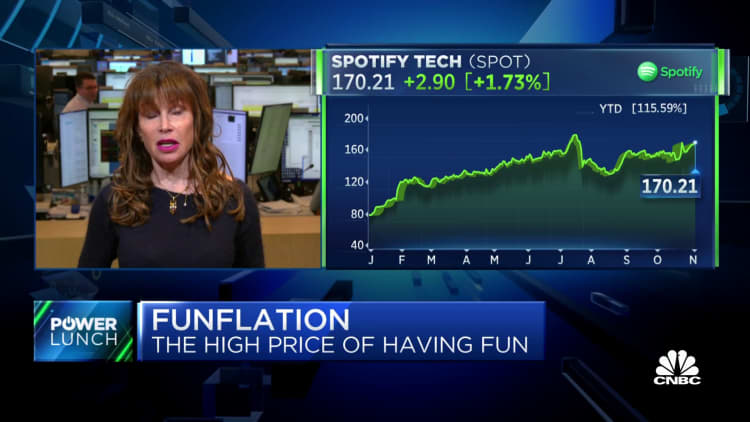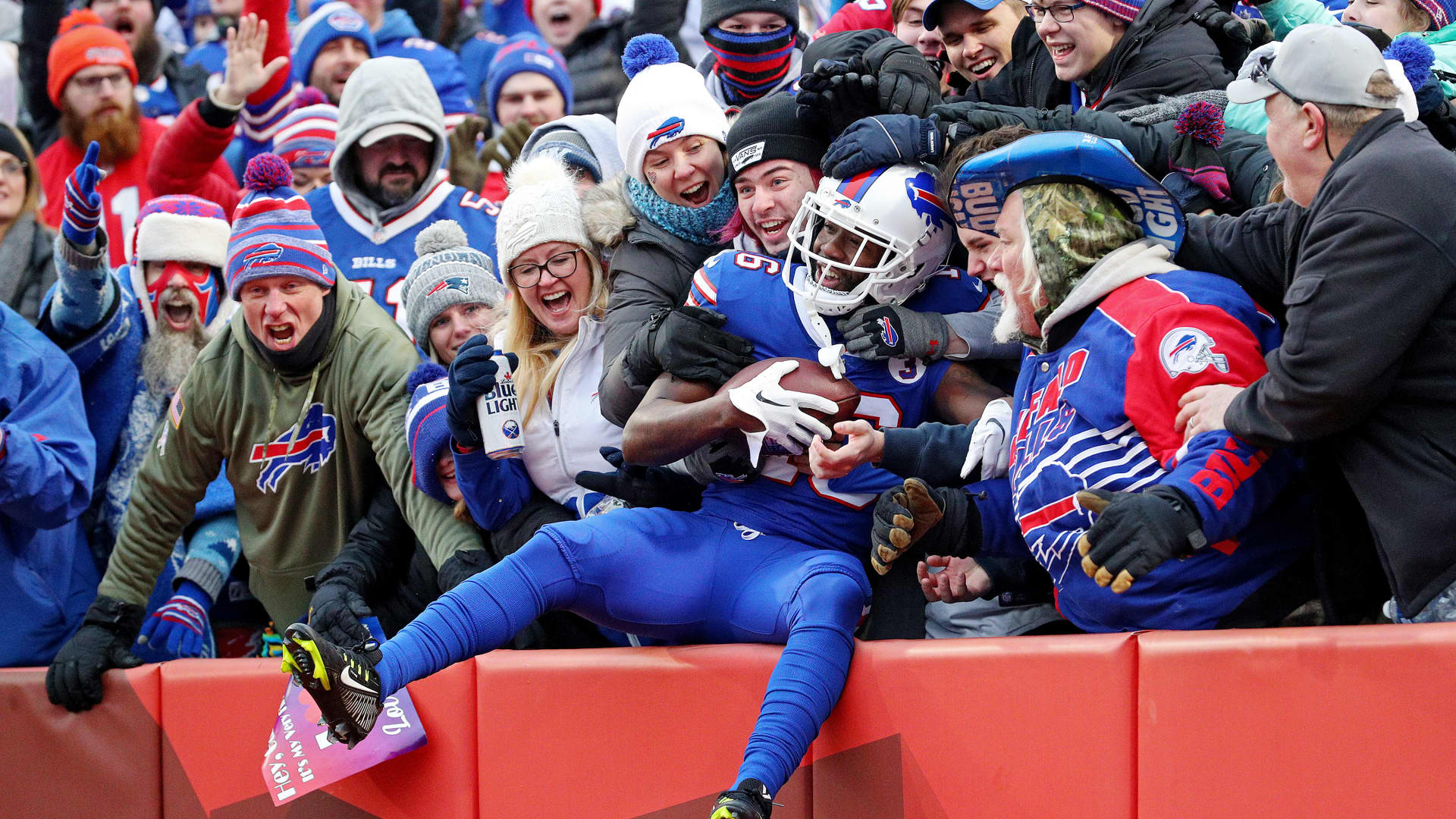John Brown #16 of the Buffalo Bills celebrates with fans after catching a touchdown pass during the third quarter against the New England Patriots at Highmark Stadium on January 08, 2023 in Orchard Park, New York. (Photo by Brian M. Bennett/Getty Images)
Brian M. Bennett | Getty Images Sport | Getty Images
Dan Hornberger has been a longtime fan of the National Football League’s Philadelphia Eagles. As an adult, his office has team memorabilia lining the walls.
Last year, the loyal fan went to five home games, about an hour and a half drive from his home. However, this year, Hornberger will be the only one attending two games as costs rise.
“I’m a big fan,” Hornberger, 40, said. “Ultimately, what it comes down to is just an outright refusal on my part to pay that kind of price.”
Sports prices rose this fall, according to federal data. That has made tickets to games the latest victim of “hedonic inflation,” a term economists use to explain rising prices for live events as consumers yearn for the experiences they missed during the pandemic.
‘Massive bounce’
Admission prices to sporting events jumped 25.1% in October 2023 compared to the same month a year earlier, according to Consumer Price Index data from the Bureau of Labor Statistics. Category saw The highest annual inflation rate out of the few hundred that make up the measure of inflation.
The CPI as a whole rose by a relatively modest 3.2% year-on-year. The index tracks the prices of a wide basket of items including milk, jewelry and airline ticket prices.
“We’ve seen it through the entire leisure and hospitality sector,” said Victor Matheson, a professor and sports economist at College of the Holy Cross. “People are coming back to things they enjoy doing and are willing to pay big.”
One reason consumers are seeing higher ticket prices for their favorite sports teams is the increasing use of dynamic pricing models, Matheson said. These structures allow ticketing platforms to fetch a greater or lesser amount per ticket, depending on the demand for the event at any given moment.
There are also a host of eye-catching sporting events taking place this fall. Aside from the usual major league seasons, last week’s Formula 1 race in Las Vegas and the announcement of soccer legend Lionel Messi’s move to Inter Miami this summer boosted enthusiast spending.
But Matheson said the main reason behind the astonishing 25.1% jump was how much prices had fallen a year ago. Teams reduced the value of tickets in 2022 in an attempt to win back fans who were accustomed to watching at home.
Sports ticket prices rose 14.2% in October compared to November 2019, a smaller increase than the 19.6% increase for the entire index, a CNBC analysis of CPI data showed. Much of the upward pressure on admission costs has come this year, highlighting the role of inflation as consumers shift their attention from Taylor Swift and Beyoncé concerts to NFL and Major League Baseball games.
“We are seeing a huge recovery in prices,” Matheson said.
NFL and NHL sales nearly doubled in 2023 from the previous year, according to ticketing platform StubHub. NBA sales were up about 60% at the start of the season compared to last season, while college football saw an increase of about 50%.
To be sure, not every sport this year saw the same growth in prices. Ticket prices at the top 10 sporting events were 15% higher in 2022 than in 2023, StubHub said.
Matheson said that lower inflation overall would help moderate growth in specific sectors. A return to a more normal entertainment spending routine after the post-pandemic experience boom could also help cool demand and prices, he added.
“Really annoying”
Interest in attending games should be fairly stable even if the economy worsens, said Rodney Ball, director of the sports analytics program at Syracuse University. That’s because a large portion of the consumer base is well-off enough to buy pro-sports tickets — which he said are essentially a luxury item — and should be able to weather the recession better given their financial situation.
But any tangible change in the state of the economy could prompt less financially stable fans to cut back on overseas expenditures, which in turn hurts demand, Paul said. Matheson said cash-strapped consumers may justify spending more than they’d like this year by reminding themselves that they didn’t spend much or at all on game tickets during the pandemic.

Some sports fans say part of the financial pressure comes from the ticket resale market. Rising prices for in-stadium parking and food must also be factored into the financial calculations of fans like Hornberger and Sarah Weddington.
Weddington was able to save enough to attend a Kansas City Chiefs game last season, but she said that seems out of the question this year with prices soaring. The longtime Kansas City area resident said she feels for people who couldn’t watch a game before the recent cost increases.
“For such a huge part of society to be out of reach of so many people is really upsetting,” the 23-year-old said. “Not being able to go to a game is like going to a candy store and not being able to get any candy.”
However, Syracuse University’s Paul said sports have taken on a new meaning in the post-pandemic world. With more people working from home, he said there’s a greater need for personal social spaces — and those who can afford them are more willing to pay.
“There is a real passion for the kind of feeling of togetherness that the world of sports brings,” he said. “It’s a really exciting experience, and it’s probably even more exciting now because people missed it in the past.”
— CNBC’s Gabriel Curtis contributed to this report.

“Analyst. Web buff. Wannabe beer trailblazer. Certified music expert. Zombie lover. Explorer. Pop culture fanatic.”







More Stories
It certainly looks like the PS5 Pro will be announced in the next few weeks.
Leaks reveal the alleged PS5 Pro name and design
Apple introduces AI-powered object removal in photos with latest iOS update